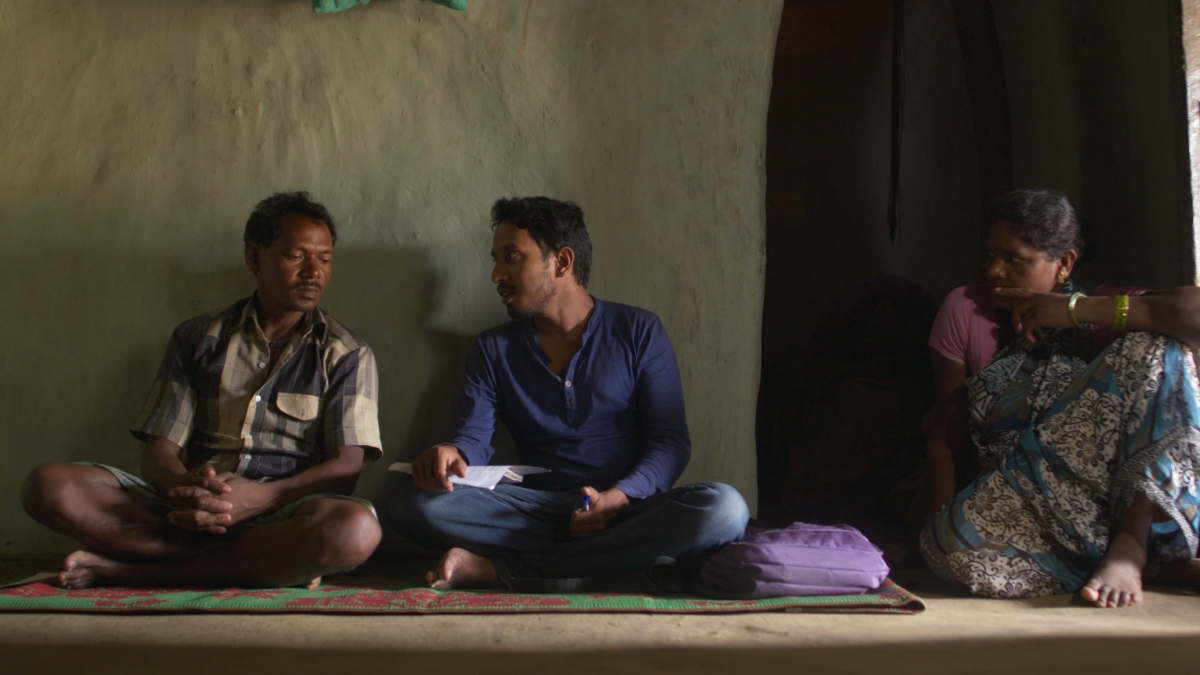Anyone feeling cynical about awards season should find inspiration in the Oscar nomination for To Kill a Tiger. The documentary directed by Nisha Pahuja and produced by Pahuja, Cornelia Principe, and David Oppenheim arguably offers the documentary success story of the year. It’s a tough yet inspiring film that tackles a hot-button topic: rape in India and the traditional patriarchal culture that enables it. And yet, at a moment when distributors and commissioners seem to be shying away from documentaries that don’t deal with celebrities or serial killers, To Kill a Tiger is proof that a film can be socially relevant and a hit with audiences. After defying the odds, it’s already a winner whatever happens on Oscar night.
It’s also a remarkable feat for a Canadian doc: To Kill a Tiger, co-produced and distributed by the National Film Board of Canada (NFB) in Canada and Pahuja’s Notice Pictures worldwide, is the first Canadian film, excluding co-productions, to be nominated in the Best Documentary Feature category since Brigitte Berman won the prize in 1987 for Artie Shaw: Time Is All You’ve Got. (Canucks Daniel Roher and Michael Donovan won for U.S. docs Navalny and Bowling for Columbine, respectively.) [Update: since publication, it was announced that Netflix picked up worldwide distribution for the film with the NFB continuing in Canada.]
Tiger’s Journey

“I have not been able to process what this moment means at all,” admits Pahuja, speaking with POV via telephone. “We’re so deep in the weeds and so deep in the trenches. We’re at this every day, a group driven by women, literally at it 24/7.” While Pahuja points out that Tiger’s success has come through engaging men in the conversation and amplifying its message with the team, one reward of the journey has been working with a core group of women to share the story with the world.
The film observes Kiran (a pseudonym), a girl in Jharkhand, India, as she decides to defy the status quo and hold her assailants to account following a brutal rape. While her neighbours encourage Kiran’s family to simply marry her off to one of the boys who did the deed, her father, Ranjit, stands by his daughter in her quest for justice. This story of resilience proves undeniably moving.
Working the Circuit
The Oscar nomination marks an incredible run for To Kill a Tiger that began at the Toronto International Film Festival in September 2022 where it won the Amplify Voices Award for Best Canadian Feature. Pahuja says she had confidence in her film, but didn’t really anticipate the potential for its reach until colleagues encouraged her to make a run for it. “It was so weird because the market is telling you one thing and people around you are saying something else,” says Pahuja.
At first, Pahuja says the festival circuit told another story. Comparing To Kill a Tiger to her 2012 hit The World Before Her, which screened at well over 100 festivals after winning top prizes at Tribeca and Hot Docs, major American festivals didn’t bite. “The World Before Her, to me, felt like it had a very different trajectory. We couldn’t keep up with the festival demand for that film,” says Pahuja. And yet, as To Kill a Tiger built its way up the circuit, festival by festival, screening after screening, award upon award, audiences connected with its story.
It’s racked-up prizes from the Canadian Screen Awards and the Directors Guild of Canada, but also from international bodies like the Social Impact Media Awards and the Palm Springs Film Festival (an Oscar bellwether). But more importantly, it’s sparked conversations with audiences around the world.
A Family’s Journey
Pahuja’s project, moreover, is a years-in-the-making production that allows Kiran to step away from the veil of anonymity because she came of age while making the film. It’s her choice to reveal herself in To Kill a Tiger and the doc is stronger for it.
But the significance of the Oscar nomination hasn’t quite hit Ranjit or Kiran yet, just as it’s still sinking in for Pahuja. “Kiran screamed; she was just over the moon. She was so happy,” says Pahuja. “Ranjit gave a statement that was so beautiful: ‘I don’t really know what the Oscars are, but I understand that they’re a really big deal. The fact that our story has reached this stage means that people are resonating with our struggle for justice,’” adds Pahuja, paraphrasing Ranjit’s words. “Then he said, ‘We hope that our struggle for justice and our story casts light into darkness.’ He wanted to thank a bunch of people, and he said, ‘The person that I want to thank the most is my daughter because she gave me the courage to keep fighting.’”
It Takes a Village
This message about not giving up the fight has been key to Tiger’s success reaching audiences. Pahuja hasn’t stopped hustling since To Kill a Tiger premiered over 16 months ago to expand the reach for this story. The film’s drawn a host of influential executive producers who pitched it, proving the old adage that it really does take a village. “They just saw the film, felt so deeply moved by the story, and said, ‘What can we do to help?’ They gave the film this kind of oxygen and people started to notice it,” says Pahuja.

Among the earliest advocates was global health advocate Atul Gawande, who helped aboard comic Mindy Kaling. Jump to August 2023 and the NFB announced the addition of Oscar-nominated actor Dev Patel (Slumdog Millionaire, Lion) to the list of executive producers that includes poet Rupi Kaur, filmmakers Deepa Mehta and Andy Cohen, and former NFB super-producer Anita Lee, who helped usher To Kill a Tiger through its production before jumping over to TIFF’s programming team.
“Anita Lee has also been really central to what we’ve managed to achieve with the film,” adds Pahuja. “As the former Executive Producer and Head of Studio at the NFB, she greenlit the project and worked with us from development to picture lock. Now, as the Chief of Programming at TIFF, she continues to champion the film and brings her invaluable, international experience. And TIFF itself was pivotal to the film’s launch.”
Going Alone
And yet despite the critical acclaim, accolades, audience reception, and varied crew of notable supporters, To Kill a Tiger remained a tough sell. Canadian media rarely picked up news about the home team and U.S. distributors gave mixed offers.
“For social-political documentaries, there are not many homes for them any longer,” observes Pahuja. “There was substantial interest in the film in the United States, but I felt that my vision for the film and my idea of what the film could accomplish were sometimes at odds with what was being offered to me. It felt smarter to go it alone.”

When one points out to Pahuja the element of life imitating art with the story of going for it alone, she can’t help but laugh. “Not only is it Ranjit’s faith to go through this and his daughter’s way to go through this, but even getting their story out into world was like pushing a rock up the hill,” says Pahuja. “But it’s so worth it, and now here we are at this incredible moment.”
Furthering the Conversation
But Pahuja adds that Ranjit and Kiran’s underdog story is part of what makes To Kill a Tiger so appealing to audiences. “In terms of the issue, there are a lot of conversations around the fact that this is not an issue that is exclusive to India,” notes Pahuja.
“You have to look at sexual violence around the world. If look at the statistics, certainly know in the U.S. and the U.K., for example, the rates of conviction, the rates of reporting, how many people go to trial…they’re really dismal. The obstacles that survivors like Kiran go through and what her father was going through—that sense of shame, that sense of guilt—that is such a common narrative for survivors around the world, as are the barriers to justice that that they have to navigate. Those are the kinds of conversations that we’re having.”
While To Kill a Tiger has yet to screen in India, Pahuja says that plans are in the works to keep the conversation going in the country, especially once the film’s impact campaign kicks into gear. Working with the human rights organization Equality Now, Pahuja says that Tiger’s impact campaign focuses on “encouraging other survivors to come forward, sensitizing the systems that all survivors have to navigate and having a dialogue about masculinity.”

An International Field
Landing one of five spots in the world’s highest platform for cinema gives a well-earned boost to these conversations. While the Oscar nominations in the feature documentary category have inspired some hand-wringing from the American trades given the absence of U.S. productions, celebrity works, and major streamers with deep pockets, Pahuja isn’t fazed. (The nominations have also been praised by critics.)
Moreover, when Pahuja looks at the competition, she sees the nominations, which include the Ukrainian doc 20 Days in Mariupol, Tunisian hybrid Four Daughters, Chilean production The Eternal Memory, and American-British-Ugandan co-prod Bobi Wine: The People’s President as a reflection of the Academy’s recent push to diversify the voting body. “There has been an opening up of the branch internationally, it is reflective of a certain taste,” observes Pahuja.
When asked whether the nominations reflect a statement by the doc branch, or a course correction to go back to the core of what of what documentary stands for, Pahuja says that’s an interpretation, but has another idea about the field. “I would like to think that they just voted for what they felt were really strong movies,” she says. “Maybe it’s as simple as that.”
Isn’t that what the Oscars should be all about?












